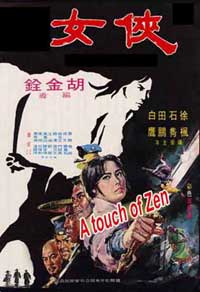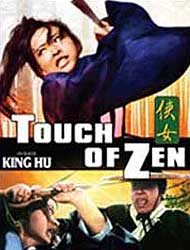 King Hu's widely acclaimed A Touch of Zen sometimes subtitled The Gallant Lady (Hsia Nu, 1971) assuredly deserves its fame. It won the Grand Prix de Technique Superieur, the first Chinese movie to receive a Cannes award.
King Hu's widely acclaimed A Touch of Zen sometimes subtitled The Gallant Lady (Hsia Nu, 1971) assuredly deserves its fame. It won the Grand Prix de Technique Superieur, the first Chinese movie to receive a Cannes award.
I've seen it three or four times on the big screen & a couple more times on dvd, revisiting it intervals along the years. Between viewings it always becomes gigantic in memory. Then I see it & realize my memory of it did not exaggerate at all, that it's an even finer film than I recalled.
It goes well beyond the best period kung fu or wuxia genre films, & is a meditative work of art, which fact may well annoy the die-hard chop-socky fans who would prefer to hear "slap! slap! slap!" of empty hand, "clank! cling!" of sparking swords, & the squeeky-balloon sound of flexing muscles pretty much without interuption.
There is no action at all for the first third of the film, as the life of an eccentric slightly lazy scholar is the focus.
It has forever surprised me that this commercial & artistic success never influenced the Hong Kong wuxia assembly lines to likewise start films out quietly with strong, fascinating characters, instead of instant endless fighting of cardboard heros & villains. But the comercial product remained certain the paying public was retarded & only wanted to see fast action & wasn't apt to care about such unnecessary niceties as atmosphere, believability, & characterization.
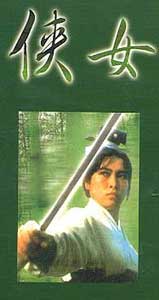 To me the scholar Ku Shen Chai (Shih Chun or Shi Jun) was a fascinating guy going about his daily business, sticking his nose places it might not belong, but mainly just trying to avoid working too hard. To me the scholar Ku Shen Chai (Shih Chun or Shi Jun) was a fascinating guy going about his daily business, sticking his nose places it might not belong, but mainly just trying to avoid working too hard.
He makes a tiny living with an open studio on the main street of a mountain town, accepting portrait commissions. In a society where he's expected to have greater ambitions, he simply doesn't.
He & his mother live in one of the buildings of a ruined fort further up the mountain, as there is no rental fee in a place many believe to be haunted. They've built themselves a wonderful large home in this quiet location.
Our happy scholar would be just as glad if life never changed. But his mother dreams of her son being successful some day, & wants him to take the government scholars test, something he'd rather not bother with.
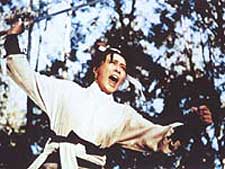 Into the quiet village, & inevitably into the quiet life of the scholar, several characters will begin to intrude, lending mystery which incites the scholar's curious nature. First into his sights is the traveller Ouyang Yin, who steps into Shen Chai's studio for a portrait. Into the quiet village, & inevitably into the quiet life of the scholar, several characters will begin to intrude, lending mystery which incites the scholar's curious nature. First into his sights is the traveller Ouyang Yin, who steps into Shen Chai's studio for a portrait.
There are others relatively new in town, including Dr. Lu the herbalist, & a blind fortuneteller named Shih. But when Shen Chai spots visitors to his town who he's pretty certain are East Chamber agents (the Emperor's police force notorious for cruelty & corruption), he is certain something unusual is in the wind.
In the crumbling old fort is one building no one has ever tried to squat in because believed to be the center of the fort's hauntings. But now a Miss Yang Hui-ching (Hsu Feng) has moved in. Shen Chai, so eccentric that his own mother calls him "a lonely nut," immediately likes Miss Yang, & since she too appears to be alone & poor, she would like it if Miss Yang could become her son's bride.
She's a stunning beauty & Shen Chai gets his hopes up, but his mother's attempt to arrange a marriage fail, for reasons Miss Yang will not reveal. Mom presumes it's because her lazy son refuses to take the scholar test & obtain an official post. He has no clue that she is a notable swordswoman.
Eventually Miss Yang reveals that she does have an interest in Shen Chai, perceiving that a child by him would save her family line along with his from extinction. A Touch of Zen was for its day a pleasant variation from the usual expectation of a completely wholesome heroine void of sexual feelings. Here the swordswoman is permitted a healthy sex life.
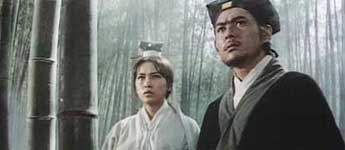 This was rarer than might seem the case from the more libertine viewpoint of today's filmmakers, but at the time a heroine who was sexual was far rarer than a femme fatale who was sexual. Even today when there's plenty of tits & ass in period films, it's mainly for titillation of the audience, not as part of a well-rounded action-heroine's life & character. This was rarer than might seem the case from the more libertine viewpoint of today's filmmakers, but at the time a heroine who was sexual was far rarer than a femme fatale who was sexual. Even today when there's plenty of tits & ass in period films, it's mainly for titillation of the audience, not as part of a well-rounded action-heroine's life & character.
Or the parallel cliche has been that women who fall in love, whether or not physicially desirious in their abject & frequently whiny devotions, inevitably need the protection of the man they fixate upon. Such women are not competent in & of themselves, though perhaps stoic when tied up, tortured, raped, or suffering that fate worse than death, abandonment.
A Touch of Zen reverses the norm as the heroine abandons her lover & only returns because he needs further protection after he takes charge of raising their infant.
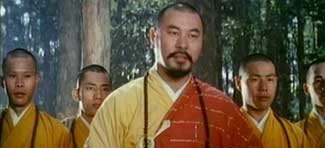 Scholars who need the protection of a powerful maiden is not the norm in wuxia, but the role reversal is quite old in Chinese literature & opera, with the often-filmed opera tale of Green Snake, White Snake the classic case. Scholars who need the protection of a powerful maiden is not the norm in wuxia, but the role reversal is quite old in Chinese literature & opera, with the often-filmed opera tale of Green Snake, White Snake the classic case.
Shen Chai isn't quite as helpless as White Snake's scholarly beau, however, as Shen Chai has studied tactics of war. Though no warrior, he at least helps plan the battles that will result in victory of the few against the many.
A heroic swordswoman in classica wuxia tends to be extraordinarily pure-minded, & not only exempt from sexual harassment, but often enough naively sexless, possibly even dressed as a boy thinking she can escape the softer nature of her gender, while everyone in the cast pretends she isn't just the most gosh darn pretty girl anyone ever saw in trousers.
Being naively sexless is a step upward from having to deal with persistent harrassment by bad guys doing the medieval equivalent of hubba-hubba-baby in front of the Seven-Eleven, but King Hu early arrived at a point far ahead of his contemporaries. His honest, liberated notion appears to have been that a healthy swordswoman might also like a physical relationship, without losing her essential purity & nobility.
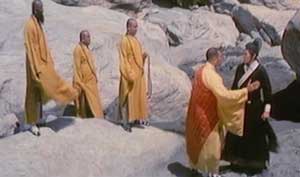 A Touch of Zen being the length of two films is beautifully paced to convey depth of character & a story which is as fascinating as the swordplay that will eventually erupt. And the sword combat scenes are numerous & beautifully choreographed once they begin.
A Touch of Zen being the length of two films is beautifully paced to convey depth of character & a story which is as fascinating as the swordplay that will eventually erupt. And the sword combat scenes are numerous & beautifully choreographed once they begin.
Though there's some Buddhist supernaturalism, & increasingly unlikely leaping skills as the battles progress, in general the swordplay & boxing are realistical, not dominated by the sort of wire-fu fantasies that tend to be high camp rather than high art.
The action in the film should reward even those viewers who prefer wuxia to have nothing else, with just a little patience. We'll meet the good General Shih Wen-chiao (Ying Bai), a very powerful swordsman who seems to enjoy getting into duels by night, providing the film with moodily photographed encounters.
Then there's the abott Hui Yuan (Roy Chao Hung) who taught Miss Yang martial arts & who can stand before swords with empty hand.
Eunuch Wei with his East Chamber thugs is the biggest villain, whom the Yang family enraged leading to their political downfall & slaughter. Wei is intent on eradicating every living member of the Yang clan.
Ou-Yang Yin (Tin Peng), a captain of the East Chamber guard who is first to track down Miss Yang, although a major henchman for the key villain, is not so bad as bad guys go. He has a degree of heroic character, fighting dutifully even if for a bad cause.
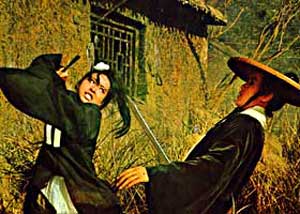 We will get a touch of wire-fu here, too, especially in the battle in the bamboo forest which concludes Part I of this epic. We will get a touch of wire-fu here, too, especially in the battle in the bamboo forest which concludes Part I of this epic.
The bamboo forest sequence is one of the most imitated bits of staging through which King Hu influenced the whole genre to follow in his wake, & has never been improved upon for visual amazement, though in The House of Seven Daggers (Shi mian mai fu, 2004) Yimou Zhang just about equalled the original.
When General Mun Ta led a night assault against the squatters' fort seeking the life of Miss Yang & all who would support her, hooboy were the hunted ready. The would-be army of assassins fall prey to traps, false ghosts, & ambush swordplay designed by our scholar-hero. An enemy of two-hundred is defeated by a tiny ill-armed band protective of Miss Yang.
Our scholar is at first joyful when he sees that his tactics have saved those he cares about, but slowly he becomes dispirited for having facilitated so much death. The next morning the mountain monks arrive to bury the dead, & Miss Yang afterward disappears, to our scholar's sorrow.
He heads off into the mountains to find his beloved, but what he finds months later are the monks who defend her as a novice intent on becoming a nun. They bring Shen Chai his son, the posterity of the Ku & Yang families, but he must not expect ever to be reuinited with his beloved.
Another filmmaker might've ended the tale right here & left the viewers satisfied, there are for Touch of Zen big events yet to come. Miss Yang could not yet wed Buddha when her Shen Chai & their infant are yet in peril. Hsu Hsien Chu the Commander-in-Chief of the East Chamber is the next villain to rise against the last of the Yangs, a man without scruples or conscience whose success would also mean the end of the Ku lineage of scholars.
This villain is extraordinarily powerful & it will take the chief abbott & his monks' most meditative kung fu to bring him down, not without great cost. It's hard to imagine a climactic battle that could up the ante of awesomeness from the bamboo forest encounter that concluded Part I. But this action sequence is a two-reeler covering about twenty minutes.
The abbott's golden blood & his slow descent from a mountain top are veritably revelations of Hui Yuan's buddhahood or status as a bodhisattva. This lends the story a "sword & sorcery" appeal but with mystic intelligence instead of cartoon wizardry. And to the susceptible imagination, when this three hours of otherwordliness is over, both body & spirit will be awash in wonder.
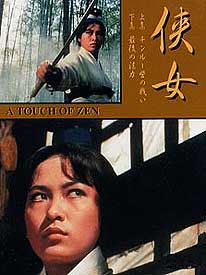 King Hu was to Chinese filmmaking what Satjit Ray was to filmmaking in India; or what Kurosawa was to Japan, or the highly literate John Huston to Hollywood. Hu was rarely permitted to make the films he wanted to make, however, so never quite duplicated the ideality & perfection of A Touch of Zen.
King Hu was to Chinese filmmaking what Satjit Ray was to filmmaking in India; or what Kurosawa was to Japan, or the highly literate John Huston to Hollywood. Hu was rarely permitted to make the films he wanted to make, however, so never quite duplicated the ideality & perfection of A Touch of Zen.
Indeed even this great film would not exist but that Hu founded his own production company. But after spending three years making A Touch of Zen he pretty much bankrupted himself, despite that it was an international hit.
And his company's first film Dragon Gate Inn (Long men ke zhen, 1966) was likewise a runaway hit throughout Asia, but did not make his company solvent. So financially speaking he sure didn't teach Shaw Brothers any lessons.
The indefatigable swordswoman as played by Hsiu Feng is a calm, serious, powerful screen presence, & it's just so thrilling to see an evocation of "medieval swordswoman" that seems plausible rather than straight out of a low-end comic book or brass-bra sword & sorcery tale.
She also played the thief & martial artist in Hu's 1980 feature Raining in the Mountain (Kong shan lin yu, 1979), & is other King Hu classics, as well as the star of the best film ever directed by Wu Ma, The Deaf & Mute Heroine (Long e jiang, 1971).
Hsiu Feng became Hu's favorite & ideal martial actress after the retirement of Cheng Pei Pei whom Hu starred in Come Drink with Me (Dai zhu zi, 1966), the film whose cost overruns so annoyed Shaw Brothers & caused a mutual falling out, but which stands to this day as the best film Shaw Brothers ever produced.
Had Come Drink With Me remained King Hu's greatest film he'd've been one of the masters of world cinema with no question whatsoever, but that he went on to A Touch of Zen meant he would outdo his own greatness & create not just the single greatest wuxia ever made, but one of the greatest movies of any kind anywhere ever.
copyright © by Paghat the Ratgirl
|
